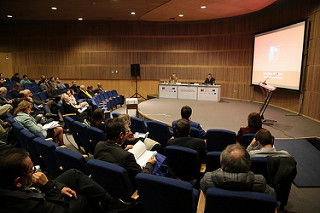According to the Head of the Policies and Studies Division of the Under-secretariat for Regional Development, "Regionalisation does not mean decentralisation; however, the most beneficial approach is probably that in which both processes come together"

The emblematic Bicentenary building in Santiago de Chile played host to the seminar titled “Conditions for a Special Territories Policy in Chile”, organised by the Under-secretariat for Regional Development (SUBDERE) and the EU’s EUROsociAL+ programme. The event was part of the joint project on decentralisation and regional development coordinated by the FIIAPP through EUROsociAL’s democratic governance department.
The agenda was opened by the Head of the Policies and Studies Division of the SUBDERE, Viviana Betancourt, and Bárbara Gómez, who represented EUROsociAL+. It also involved public officials and managers from the sector at regional government level, academics and representatives from research centres and regional development corporations. The seminar had one specific goal: to define and draw up a draft Development Plan for the Macrozone of Northern Chile.
Accordingly, Viviana Betancourt stated that, “In recent times, the SUBDERE has received a significant amount of territorial demand, including the creation of new municipalities and regions, requests that seek to embody a past of territorial reinforcement”. She also said that, “Regionalisation does not mean decentralisation; however, the most beneficial approach is probably that in which both processes come together”.
She also explained that, through the Policies and Studies Division, the SUBDERE “has focused consistently since 2016 on staging a number of seminars each year to publicise the research work carried out by the Division’s officials and foreign experts”.
During the event, participants reflected on and discussed international experiences in development plans and policies for cross-border areas and macrozones. They also analysed national proposals for identifying macrozones and studies on borderlands.
The agenda included a presentation by Edgardo Cruzado, Secretary for the Decentralisation of Peru, who spoke about “International experiences: the Development of Cross-border Areas”. He sat on the same panel as Henry Saldívar, a professional from the Policies and Decentralisation Department of the SUBDERE who spoke about “National Experiences in the Development of Cross-border Areas: Borderland Development in Tierra del Fuego”.
The next panel during the event involved Sandra Jorge, the Portuguese Deputy Coordinator of the Alentejo Region for the Programme and Official of the Alentejo Regional Development and Coordination Committee (an interregional cooperation programme between Spain and Portugal). She took part alongside Arturo Sáez, a professional from the SUBDERE, who spoke about “Border Development in the Andes”.
This was followed by the panel for “Macrozone Development Policies”, made up of Fernando Sánchez-Beato, Deputy Director General for Transfers and Bilateral Relations with the Autonomous Communities of Spain-SEAT, and Pablo Monje, a professional from the University of Chile.
The panel for “Chile, a Territory of Diversity” involved Francisco Ther, a professional from the University of Los Lagos, Gonzalo Falabella, an academic from the University of Chile, and Karina Vargas, representing the SUBDERE.
The event was closed by the Head of the Policies and Decentralisation Department of the SUBDERE, Osvaldo Henríquez, who presented the “Annual Decentralisation Report: Progress in Legal and Fiscal Policies in the Process for the Decentralisation of Chile”.
As part of the third phase of the EUROsociAL+ programme, the Governance Department has lent its support to the SUBDERE of Chile for the Design of an institutional architecture for the multilevel management of specific territories (Macrozones and Border Areas) and the reduction of moral hazards in the regional decentralisation of Chile. Accordingly, the event offered information on interesting international experiences and technical advice that will be useful for the final proposal of the Macrozone policy.
For more information about the seminar and the speakers’ presentations, please log on to http://seminarios.subdere.gov.cl/
EUROsociAL+ / SUBDERE



